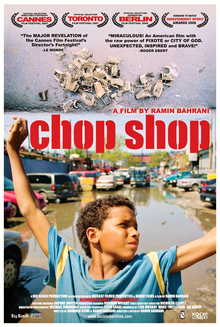This film opens with the name of the production company and the title and nothing else, as if allowing the film to speak for itself. And speak it does. The director’s name and the acting credits only appear after the end of the film. The two leads apparently play some fictionalized version of themselves and the director Ramin Bahrani isn’t exactly a household name, but he was the scriptwriter for The White Tiger that we watched not long ago. As different as the settings of these two films are, both are about under the underclass of society and Chop Shop may well be one of the best films about the lives of illegal immigrants in the United States ever made.
Alejandro, or Ale for short, is a 12-year old orphan and an illegal immigrant who lives in New York. He does whatever odd jobs he can get to survive and his only family is his older sister Isamar. His friend Carlos introduces him to a job at an auto repair shop and the owner, Rob, also allows him to stay in a room at the back of the shop. Being a hard worker Ale soon picks up many skills, including fixing up cars and negotiating with customers, and invites Isamar to come stay with him. He also gets her a job working at a food truck on the same street but is jealous of the time she spends with her own friends. He still dreams of a better life for the two of them however and finds an old van being sold by an uncle of Carlos. He believes he can buy it and turn it into a food truck business of their own. This means saving a large amount of money so in addition to his normal job, Ale also sells illegal DVDs and steals hubcaps from the cars parked at a nearby stadium. When he discovers that Isamar is also prostituting herself, he is ashamed and dismayed but doesn’t do anything to stop her.
Some films are so good that you can immediately tell that right from the start. The opening scene of Ale desperately trying to get a job on a construction crew despite being far too young for it, is so relatable and authentic that you just know this is going to be an extraordinary film and it doesn’t disappoint. As a no-holds-barred portrayal of the immigrant experience in the US, this film avoids making mistakes like making Ale overly sympathetic or exaggerating his woes. Ale works hard and learns fast but he is also selfish and opportunistic, not about breaking the law and taking risks to earn more money. His employers are portrayed as being tough but mostly fair. It’s obvious that Rob letting Ale and Isamar stay in the shop means getting free security there as well but that works out well for both parties. At the same time, it is delight to watch his joy at simple pleasures, such as having a tiny room of his own with a mini-fridge in which to keep the cool drinks he is so inordinately proud of. The characterization is psychologically complex too. He jokes with Carlos about sex and whores but then quickly clams up when he recognizes his sister. Carlos is a great character to contrast Ale with, being of a similar age, but with a mindset more like the children they should be if they were not forced to fend for themselves on the streets.
Characters aside, the film also presents a unique view of America: the world’s leading superpower as a third-world country because that is the part of the country as experienced by fresh immigrants. The Willets Point neighborhood that serves as the setting is nicknamed the Iron Triangle, due to the proliferation of auto repair shops and junkyards there. The streets are lined with trash, full of potholes and are prone to flooding. Touts like Ale solicit customers looking for cheap repairs and street crime is rife. This really is a side of America, and especially of New York, that we almost never seen in any media. A particularly genius move is to also use the nearby Shea Stadium as a symbol of rich, white America. It’s a level of wealth and comfort that Ale and his peers can only aspire to from afar and yet Ale isn’t above viewing them as a source of easy money, stealing from them as they converge there in large numbers for baseball games.
Too many filmmakers who highlight the plight of the underclass focus exclusively on their misery and how deserving they are of our sympathy. While that is true, this can only ever be one part of the whole picture and this film is so great because it gives a fuller, more complete portrait of the life of one such immigrant. I particularly appreciate how the film makes Ale instantly likable, being so hard-working and so earnest in dreaming of a better life. Yet it also shows that without education and mentoring there’s only so far that his street smarts can take him. He might make it big and become rich. But it’s likelier than his crimes and lack of any knowledge of how the laws and institutions of the US actually work will eventually catch up to him.
